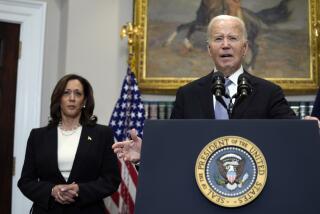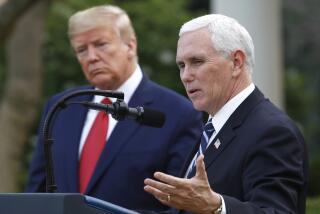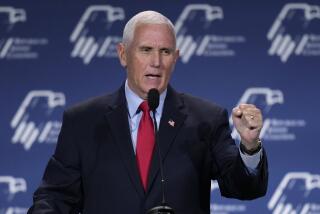Gore Rules Out Bid for White House, Citing His Family : Politics: Tennessee senator becomes the third Democrat in recent weeks to decide not to run. Collapse of Soviet coup did not affect decision, he says.
- Share via
WASHINGTON — Sen. Albert Gore Jr. of Tennessee took himself out of consideration Wednesday for the 1992 Democratic presidential nomination, asserting that his concern for his family outweighed his ambition for the White House.
But the timing of Gore’s announcement, coming just as the collapse of the Soviet coup attempt further boosted President Bush’s prestige, raised questions about his actual motives. “It just makes it look like he got scared off by what happened in Moscow and chickened out,” said one senior Democratic strategist.
Whatever his reasons, Gore’s decision seems likely to help fellow Southerner Bill Clinton, the governor of Arkansas, by giving him a freer shot at gaining political and financial support in Dixie. And it frames the 1992 Democratic presidential campaign as mainly a prospective struggle between Clinton, who as former chairman of the Democratic Leadership Council speaks for the party’s moderate-to-conservative wing, and unabashed liberal Iowa Sen. Tom Harkin. Neither man has yet declared his candidacy, but both are exploring the race.
“I think this opens up a great opportunity for Bill Clinton that he would not otherwise have had,” said Democratic pollster Mark Mellman, an adviser to Gore’s 1988 presidential campaign. “At some level, they (Gore and Clinton) would have been competing for the same constituency.”
But Tim Raftis, a Harkin adviser, said Gore’s withdrawal could work to Harkin’s advantage by helping him rally support from the party’s progressive forces. “It more clearly defines the race,” Raftis said, “and helps establish Harkin as the clear alternative to Clinton.”
Gore became the third prominent Democrat in recent weeks to decide against challenging Bush, following West Virginia Sen. John D. (Jay) Rockefeller IV and House Majority Leader Richard A. Gephardt of Missouri, who like Gore had sought the nomination in 1988. And his withdrawal is likely to intensify concern among Democrats about the absence of a prominent party leader from the race.
In his statement, prepared at his home in Carthage, Tenn., and made available in Washington, Gore said: “My family--my wife and four young children--are more important than politics and personal ambition.”
He said the serious injuries suffered by his 8-year-old son, Albert III, in an auto accident two years ago had given the family “a new appreciation both for what we mean to each other and for the time we share together.”
In a telephone interview, Gore scoffed at the idea that his decision not to run had been influenced by the dramatic events in the Soviet Union. “That’s simply not true,” he said. “I made the decision two days before the coup took place.” At that time, Gore said, he was vacationing on a lake in Tennessee with no telephone nearby.
“Those people who say that coup in the Soviet Union will have a dramatic impact on the American election of 15 months from now have no sense of how far away the election is and how little impact this event will have on it.”
Another 1988 contender, the Rev. Jesse Jackson, is considered unlikely by party leaders to make the race, though he has said he will not make up his mind until this fall. And New York Gov. Mario M. Cuomo is still mentioned as a possibility, though he repeatedly has said he has no plans to run.
The only announced candidate is former Massachusetts Sen. Paul E. Tsongas. In addition to Clinton and Harkin, two other nationally known Democrats are considering the race: Virginia Gov. L. Douglas Wilder, and former California Gov. Edmund G. (Jerry) Brown Jr., who sought the nomination in 1976 and 1980 and appears to be edging closer to another attempt in 1992.
One such indicator of Brown’s intentions was the resignation Wednesday of George Cappannelli as coordinator of the committee that Brown had been using to explore a bid for a U.S. Senate seat from California. Sources said Cappannelli had been concerned about the logistic difficulties of launching a national campaign, and his quitting suggested that Brown was leaning increasingly toward running for President, rather than senator.
Brown said that he would announce his decision in a few weeks, but called Gore’s decision more evidence of a “vacuum” in the Democratic Party. “It’s disquieting that the majority party cannot seem to find strong voices of opposition because there has never been a time in recent memory when such opposition is more called for,” Brown said.
More to Read
Get the L.A. Times Politics newsletter
Deeply reported insights into legislation, politics and policy from Sacramento, Washington and beyond. In your inbox twice per week.
You may occasionally receive promotional content from the Los Angeles Times.










